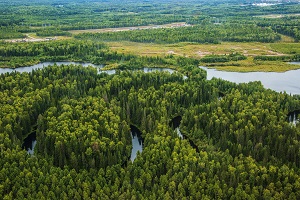Rosneft's Large-scale Integrated Environmental Forestation Project Will Capture 10 million tonnes of CO2

Rosneft has launched an ambitious integrated environmental forestation project to provide carbon sequestration of 10 million tonnes CO2-equivalent. It is a unique project for Russia that will reveal the greenhouse gas sequestration potential of the country's forests. The Company's representatives announced this during the round table Clean Future: The Role of Forestry in Achieving Russia's Carbon Neutrality.
Rosneft presented a new strategy «Rosneft-2030: Reliable Energy and Global Energy Transition» in December 2021 and became the first Russian oil and gas company setting a strategic goal to achieve carbon neutrality by 2050.
Meeting this target will be achieved by technical measures for emission reduction, increased use of low-carbon energy sources, energy-saving technologies, carbon capture and storage technologies, and by developing forest carbon sequestration (environmental forestation projects).
Natural carbon sequestration projects will provide additional support for the Company's low-carbon Vostok Oil project in the north of the Krasnoyarsk Territory. The specific emission intensity of Vostok Oil's operations will be four times lower than the average for greenfield sites of major international companies.
Rosneft intends to become a leader in the development of environmental forestation projects in Russia. For this purpose, the Company's specialists have made extensive groundwork in several areas, said Viktoria Sapozhnikova, Director of Rosneft's Environmental Efficiency Department, during a round table discussion initiated by the all-Russian environmental online platform Clean Future.
Specifically, the Company prepared proposals for necessary amendments to Russian legislation and methodologies to implement different environmental forestation projects. It also examines the possibility of developing a methodology for a fair assessment of carbon sequestration by natural ecosystems. In addition, the Company plans to implement applied and basic scientific researches, including selective and genetic studies to breed fast-growing tree species adapted to the conditions of the project and a number of other studies.
The Company's environmental forestation project will have a major nationwide positive impact. Russian forests absorb 200 million tonnes of carbon annually, according to the study of Space Research Institute of the Russian Academy of Sciences (RAS), which was presented at the round table Clean Future: The Role of Forestry in Achieving Russia's Carbon Neutrality. Thus, the Rosneft project's contribution would be about 5% of the country's total forest potential.
Rosneft's project received the approval of the Russian president. Rosneft signed cooperation agreements on the sidelines of the St. Petersburg International Economic Forum with Rosleskhoz and St. Petersburg State Forest Technical University named after S.M. Kirov, the oldest and leading forestry university in Russia, to implement the project.
Note for Editors:
Environmental forestation projects have long been implemented abroad, and a large body of international standards and certification systems has been developed. But it is not well developed in Russia yet; there are only a few examples of local environmental forestation projects of certain kinds in the country so far.
Rosneft makes already a significant contribution to greenhouse gas sequestration in Russia's forests by planting trees in regions of its operations every year. In 2021 alone, the Company and Rosneft Group subsidiaries planted more than 9.3 million tree seedlings, which are natural carbon sequestrants.
The Clean Future, all-Russian environmental online platform, was created with the support of major Russian businesses and representatives of leading academic institutions of the Russian Federation: the Institute of Economic Forecasting of the RAS, the Institute of World Economy and International Relations of the RAS, the Institute of Oceanology of the RAS, the Severtsov Institute of Ecology and Evolution of the RAS, the Institute of Geography of the RAS, the Institute of Oceanography of the RAS, the Water Problems Institute of the RAS.
Rosneft
Information Division
June 22, 2022